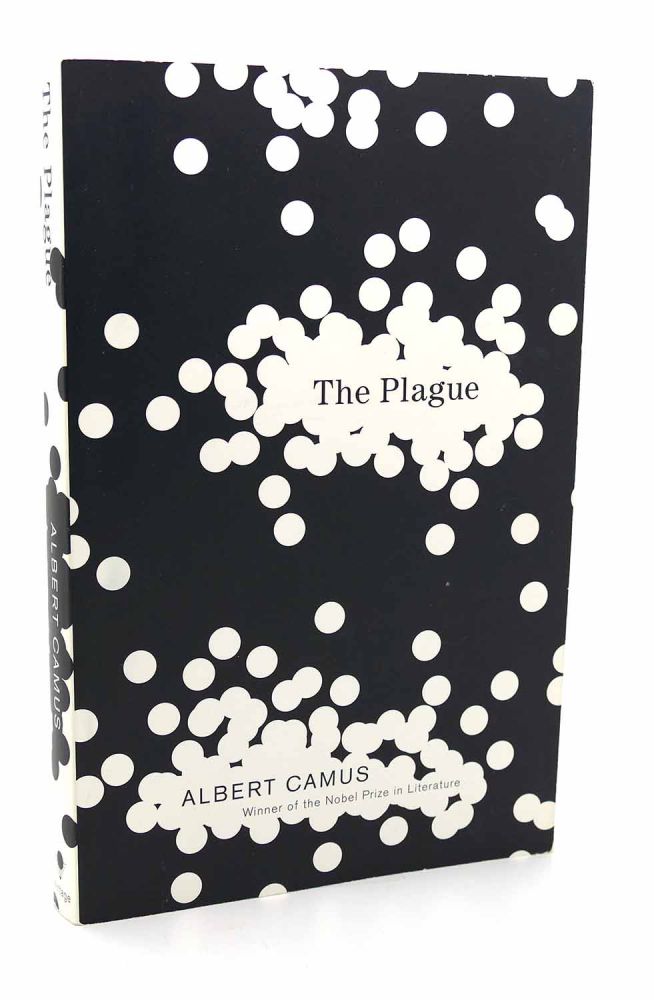
Monday
Liesl Schillinger of Literary Hub has applied Albert Camus’s The Plague (1947) to the COVID-19 outbreak and found it only too relevant, even though the coronavirus is far less deadly.
She notes that, as an existential parable, Plague can refer to either biological epidemics or a political ones (like the fascism that Camus had just watched wash over Europe). Let’s go with the biological one.
Just as Donald Trump, worried about political fallout, ordered administrators to ignore early warning signs, so signs are missed in the novel. Here too a hoax is suspected:
The first to encounter [rats dying in batches] is a local doctor named Rieux, who summons his concierge, Michel, to deal with the nuisance, and is startled when Michel is “outraged,” rather than disgusted. Michel is convinced that young “scallywags” must have planted the vermin in his hallway as a prank. Like Michel, most of Oran’s citizens misinterpret the early “bewildering portents,” missing their broader significance. For a time, the only action they take is denouncing the local sanitation department and complaining about the authorities. “In this respect our townsfolk were like everybody else, wrapped up in themselves,” the narrator reflects. “They were humanists: they disbelieved in pestilences.” Camus shows how easy it is to mistake an epidemic for an annoyance.
Even when the plague begins claiming human victims, people find ways to minimize what they are witnessing:
But then Michel falls sick and dies. As Rieux treats him, he recognizes the telltale signs of plague, but at first persuades himself that, “The public mustn’t be alarmed, that wouldn’t do at all.” Oran’s bureaucrats agree. The Prefect (like a mayor or governor, in colonial Algeria) “personally is convinced that it’s a false alarm.” A low-level bureaucrat, Richard, insists the disease must not be identified officially as plague, but should be referred to merely as “a special type of fever.” But as the pace and number of deaths increases, Rieux rejects the euphemism, and the town’s leaders are forced to take action.
Authorities are liable to minimize the threat of an epidemic, Camus suggests, until the evidence becomes undeniable that underreaction is more dangerous than overreaction. Most people share that tendency, he writes, it’s a universal human frailty: “Everybody knows that pestilences have a way of recurring in the world; yet somehow we find it hard to believe in ones that crash down on our heads from a blue sky.”
This helps explain why Trump, who’s good as diagnosing what (certain) people want, is still underplaying the epidemic. He’s telling them what they want to believe, and they are all too willing to follow his lead. In my very red state of Tennessee, polls tell me that 40% of Republicans still do not take COVID-19 seriously.
Schillinger points out an observation also made by Boccaccio (who witnessed the Black Death up close) that epidemics can lead to excessive partying. This is one way to think of the St. Patrick’s Day pub parties we saw this past week in such cities as New York, Chicago, New Orleans, and Nashville. Schillinger writes of
the “hectic exaltation” of the ordinary people trapped in the epidemic’s bubble, who fought their sense of isolation by dressing up, strolling aimlessly along Oran’s boulevards; and splashing out at restaurants, poised to flee should a fellow diner fall ill, caught up in “the frantic desire for life that thrives in the heart of every great calamity…”
In other words, some panicked instinct for life and fellowship can take over at such moments, even by people who outwardly believe the sickness will pass them by. Edgar Allan Poe’s “Masque of the Red Death” gets at the same psychological reality. At some level, this is recognized even by those 40% who are grateful to Trump for making them feel better.
Schillinger also points out a grim but predictable reality: whatever we learn from one epidemic may be ignored come the next one. Trump taking apart the Pandemic Response Apparatus that Barack Obama set up following the Ebola outbreak could have been foreseen. As Camus writes,
There have been as many plagues as wars in history. Yet always plagues and wars take people equally by surprise.

